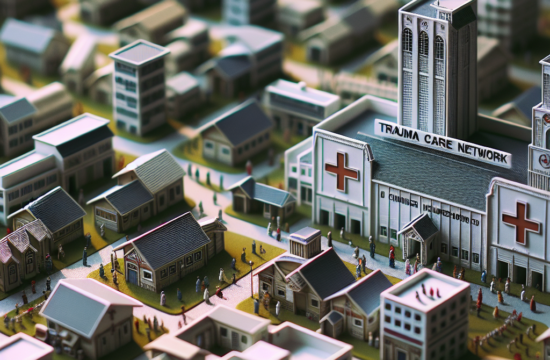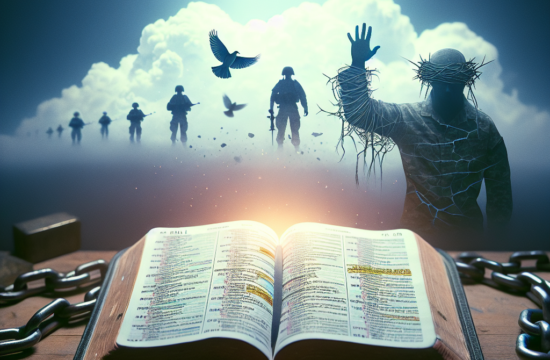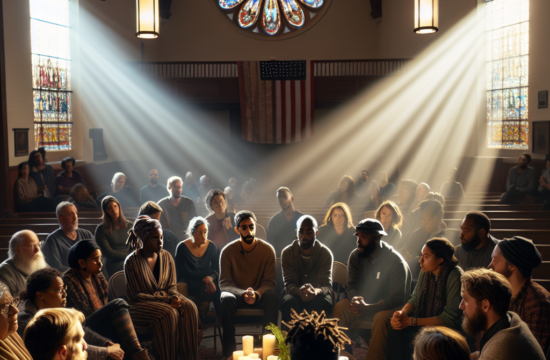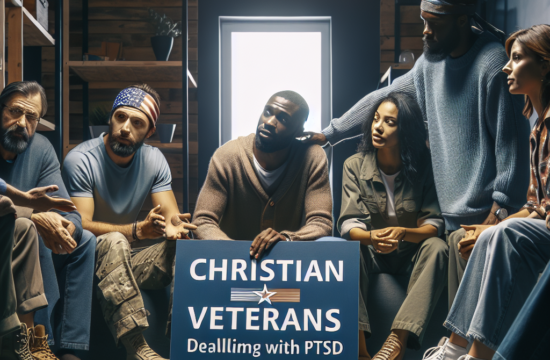==> Thank you for reading this post! Click Here If you are looking for support and Victory over PTSD.
How PTSD Healing Can Change Your Perspective
- Understanding PTSD and Its Effects
- The Healing Process: A Personal Journey
- Shifting Perspectives through Healing
- Sharing Stories and Building Empathy
Understanding PTSD and Its Effects
What is PTSD?
Post-Traumatic Stress Disorder, or PTSD, is something I never thought I could relate to until it knocked on my door. This mental health condition can develop after someone experiences or witnesses a traumatic event. You might find yourself re-living the experience, having nightmares, or feeling emotionally numb. It’s like getting stuck in a mental time warp, and the worst part is that it can feel utterly isolating.
I grew up hearing about PTSD mainly in relation to soldiers, but it’s so much broader than that. It can impact survivors of natural disasters, assaults, or even serious car accidents. Understanding its broad reach helped me realize that I wasn’t alone; many people were navigating this rocky road, just like me.
The effects can be profound and vary significantly from person to person. If you’ve experienced this, you might notice you become hyper-vigilant, overly anxious, or withdrawn. It’s essential to recognize that these responses, while complicated, are natural reactions to trauma.
The Impact on Daily Life
Living with PTSD can turn the simplest daily tasks into monumental challenges. I often found it tough to stay focused, overwhelmed by intrusive thoughts. Even the sound of a car backfiring could send my heart racing, bringing me back to bad memories. It felt like I was constantly walking on eggshells.
This heightened state of anxiety affected my relationships, my work, and my sense of self-worth. Friends would ask, “Why do you seem so distant?” and I struggled to explain that it was a battle within my mind. Understanding PTSD’s effects helped me articulate what I was experiencing so that others could grasp the reality I was navigating.
Recognizing these impacts on life was my first step. I knew if I could change my understanding, I could work toward changing my experience, too. That’s where the real healing journey began.
Breaking the Stigma
When I started sharing my experiences, I noticed many people didn’t understand PTSD due to the stigma surrounding mental health. Society often looks down on vulnerability, mistakenly believing that it’s a weakness. It felt crucial to break this stereotype and foster open conversations about trauma and healing.
By sharing my story and learning from others, I discovered how common these experiences are. It was liberating, and the more I opened up, the more others found the courage to do the same. It reminded me that we could weave a safety net of understanding rather than sit in darkness alone.
Fostering education about PTSD helps to diminish this stigma. We can remind ourselves and others that asking for help is a sign of strength, not a flaw. This becomes pivotal in our journey toward healing and changing perspectives together.
The Healing Process: A Personal Journey
Starting Therapy
I’ll be honest; taking the plunge into therapy felt daunting. But when I began, it felt akin to lifting a heavy weight off my chest. Finding the right therapist was crucial; I needed someone who created a safe, judgment-free environment. This trusting relationship paved the way to exploring my emotions openly.
Therapy gave me tools to process the trauma. It was like shining a light on the dark corners of my mind, helping me confront and understand my feelings and reactions. Gradually, I learned coping mechanisms that allowed me to navigate my everyday life without feeling overwhelmed.
With each session, I could sense the gradual change in perspective; it was no longer about simply surviving, but beginning the journey toward thriving. Every small revelation felt like a major victory.
Practicing Mindfulness
A game changer for me was practicing mindfulness. It sounds simple, but being present can be tough when your mind races at warp speed. I started engaging in mindfulness techniques like meditation, journaling, and gentle exercise. Slowly, I learned to stay grounded and focus on the here and now.
Mindfulness became a refuge; it allowed me to step away from my thoughts and emotions. I often found peace in the silence and learned to observe rather than react. This shift from reactivity to receptiveness took a lot of practice, but with time, it began to pay off tremendously.
Engaging my senses helped to anchor me, whether it was taking a stroll in nature or savoring a cup of tea. I learned to recognize when my mind was wandering back to darker places and gently guide it back to the present moment. It became like building armor against intrusive thoughts.
Building a Support Network
Creating a solid support network was essential. Sharing my journey with close friends and family transformed my world. It felt great to have people I could turn to when I was feeling low. Their empathy and understanding became invaluable resources during tough times.
Support groups, both online and in person, also played an important role. Interacting with others who understood this struggle was comforting. Listening to their stories reminded me people are resilient, something I often lost sight of during my own battles.
Building a community is fundamental; it reminds us we aren’t alone in this fight. We can share victories, challenges, and encouragement, motivating each other to keep pushing forward. The more connections I made, the easier it became to look forward with hope.
Shifting Perspectives through Healing
From Surviving to Thriving
As the healing process progressed, I found myself shifting from merely surviving to truly thriving. It felt like a rebirth; I started to see life with new eyes. Embracing change allowed me to redefine my life on my terms, shifting from victimhood to empowerment.
This new perspective encouraged me to explore interests I had previously neglected. I revisit hobbies that once brought me joy, and suddenly, the world didn’t feel so heavy anymore. It sounds cheesy, but I genuinely started to rediscover the little joys that make life beautiful.
Get Started with Recovery! Visit us for more Information and Support
By focusing on what inspires me, I found motivation in unexpected places. The transition towards thriving turned healing into a powerful journey of self-rediscovery, allowing my true self to emerge gradually, without shame or fear.
Expressing Gratitude
Fostering gratitude became another crucial aspect of my healing. I discovered that shifting my focus from lack to abundance transformed my perspective. Instead of wallowing in what I lost due to PTSD, I worked to appreciate the small things in life—like the warm sun on my skin or a kind word from a friend.
Gratitude journals quickly became my secret weapon. Each night, I’d jot down three things I was thankful for, big or small. This practice genuinely shifted my mindset, allowing me to celebrate life’s moments instead of mourning what I couldn’t control.
Over time, this positive mindset also began to ripple into my daily interactions. Expressing gratitude became contagious, allowing me to uplift those around me. It’s incredible how a change in perspective not only alters our mindset but also positively impacts our relationships.
Embracing Change and New Possibilities
Finally, embracing change acknowledged that healing isn’t linear—it’s filled with ups and downs. Accepting this reality nurtured my resilience. I learned to view setbacks not as failures but as part of the journey toward wellness. Every hiccup became a lesson learned.
Looking toward new possibilities became my new normal. I even started volunteering at local organizations, sharing my story and helping those still struggling with PTSD. The sense of purpose I gained through service made my heart soar and reshaped my outlook on life.
Embracing change led to innumerable opportunities; it reminded me that there’s a world of healing and hope out there, waiting for us. Each door opened was another testament to how healing can shift perspectives forever.
Sharing Stories and Building Empathy
The Power of Storytelling
One of the most rewarding aspects of healing has been the ability to share my story. Whether it’s through blogging or speaking at community events, I found immense power in vulnerability. Speaking my truth not only liberates me but also has the potential to reach others who feel alone.
Storytelling allows for connection, creating bonds with others in similar situations. Every time I share my experiences, I see heads nodding in understanding or tears welling in eyes. It’s in these moments that I realize my journey could have a meaningful impact on someone else.
Additionally, hearing others’ stories has been equally transformative. It reminds me that healing is universal and fosters a culture of empathy. When we dive into each other’s experiences, we break the barriers built around our individual struggles and cultivate understanding.
Encouraging Empathy in Others
Empathy is essential for navigating connections, and I learned to actively cultivate it in myself and others. When conversations arise about mental health, I encourage openness and understanding. It’s crucial for those not experiencing PTSD to grasp its emotional weight so they can respond with compassion.
Creating workshops or engaging in community dialogues about trauma is a great step toward building empathy. It helps normalize these discussions, paving the way for understanding. When people can feel and relate to the experiences of others, it builds a supportive framework for healing.
Remember that empathy can significantly impact recovery; creating an environment where people feel safe to share is invaluable. It fosters a sense of community through connection and compassion, making us feel less isolated in our struggles.
Becoming an Advocate
As I healed, I felt a deep need to advocate for mental health awareness. I recognized how essential it is for society to embrace these conversations and support others in their own journeys. Whether it’s donating to awareness campaigns or volunteering in outreach programs, these actions make a difference.
Advocacy isn’t just about the big gestures; every small act contributes to the collective understanding of PTSD and mental health. Simple conversations over coffee with friends can spread awareness and encourage more open discussions, contributing to a larger cultural shift.
Becoming an advocate has not only reinforced my healing but also empowered others who need a voice. It’s a beautiful reminder that together, we can change perspectives and foster a brighter, more supportive future for those affected by PTSD.
FAQs
What is PTSD, and who does it affect?
PTSD stands for Post-Traumatic Stress Disorder, which can impact anyone who has experienced trauma. This includes survivors of violence, accidents, abuse, or any distressing event. It’s more common than many think, affecting individuals across different backgrounds.
How can one start healing from PTSD?
Starting healing often involves reaching out for help, such as therapy or counseling. Building a support network and practicing mindfulness techniques can also be beneficial. The key is to take small steps, acknowledging your feelings, and finding tools that resonate with you.
What role does community play in healing from PTSD?
Community plays a vital role in healing, offering support and understanding. Engaging with others who have shared experiences can foster a sense of belonging and reduce feelings of isolation. Sharing stories and building empathy within a community can encourage healing, understanding, and strength.
How can I help someone dealing with PTSD?
Being a supportive friend or family member involves listening without judgment and showing empathy. Encourage them to seek professional help if they haven’t already. Sometimes, your presence alone can provide comfort, reminding them that they are not alone in their journey.












